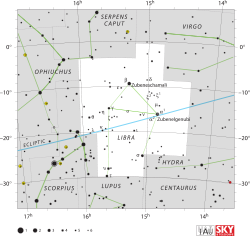Theta Librae
| Theta Librae (θ) | |
 | |
| Observationsdata Epok: J2000.0 | |
|---|---|
| Stjärnbild | Vågen |
| Rektascension | 15t 53m 49,5381s[1] |
| Deklination | -16° 43′ 45,457″[1] |
| Skenbar magnitud () | +4,136[2] |
| Stjärntyp | |
| Spektraltyp | K0 III[3] |
| U–B | +0,82[4] |
| B–V | +1,01[4] |
| Astrometri | |
| Radialhastighet () | 3,4[5] km/s |
| Egenrörelse (µ) | RA: +100,12[1] mas/år Dek.: +135,27[1] mas/år |
| Parallax () | 20,02 ± 0,88[1] |
| Avstånd | 163 ± 7 lå (50 ± 2 pc) |
| Absolut magnitud () | 0,665[2] |
| Detaljer | |
| Massa | 1,84[6] M☉ |
| Radie | 9,85[7] R☉ |
| Luminositet | 35[8] L☉ |
| Temperatur | 4 700[9] K |
| Metallicitet | -0,08[9] |
| Vinkelhastighet | 10[10] km/sek |
| Andra beteckningar | |
| 46 Librae, HR 5908, BD- 16 ° 4174, HD 142198, SAO 159563, HIP 77853.[3] | |
Theta Librae (θ Librae, förkortat Theta Lib, θ Lib) som är stjärnans Bayerbeteckning, är en jättestjärna belägen i den östra delen av stjärnbilden Vågen. Den har en skenbar magnitud på 4,13[2] och är synlig för blotta ögat. Baserat på parallaxmätning inom Hipparcosuppdraget på ca 20 mas,[1] beräknas den befinna sig på ett avstånd av ca 163 ljusår (50 parsek) från solen.
Egenskaper
Theta Librae är en orange till röd jättestjärna av spektralklass K0 III.[3] Den har en uppskattad massa som är 84 procent större än solens massa och en radie som 9,9[7] gånger större än solens. Den utsänder från sin fotosfär 35[8] gånger mer energi än solen vid en effektiv temperatur på ca 4 700 K[9].
Källor
- Den här artikeln är helt eller delvis baserad på material från engelskspråkiga Wikipedia, tidigare version.
Referenser
- ^ [a b c d e f] Perryman, M. A. C.; et al. (April 1997). "The HIPPARCOS Catalogue". Astronomy & Astrophysics. 323: L49–L52. Bibcode:1997A&A...323L..49P.
- ^ [a b c] Liu, Y. J.; et al. (2007), "The abundances of nearby red clump giants", Monthly Notices of the Royal Astronomical Society, 382 (2): 553–66, Bibcode:2007MNRAS.382..553L, doi:10.1111/j.1365-2966.2007.11852.x.
- ^ [a b c] "tet Lib – Star". SIMBAD. Centre de Données astronomiques de Strasbourg. Hämtad 2011-01-24.
- ^ [a b] Johnson, H. L.; Iriarte, B.; Mitchell, R. I.; Wisniewskj, W. Z. (1966). "UBVRIJKL photometry of the bright stars". Communications of the Lunar and Planetary Laboratory. 4 (99). Bibcode:1966CoLPL...4...99J.
- ^ Wilson, Ralph Elmer (1953). General Catalogue of Stellar Radial Velocities. Washington: Carnegie Institution of Washington. Bibcode:1953GCRV..C......0W.
- ^ Liu, Y. J.; Zhao, G.; Shi, J. R.; Pietrzyński, G.; et al. (December 2007). "The abundances of nearby red clump giants". Monthly Notices of the Royal Astronomical Society. 382 (2): 553–566. Bibcode:2007MNRAS.382..553L. doi:10.1111/j.1365-2966.2007.11852.x. See online data.
- ^ [a b] https://www.universeguide.com/star/thetalibrae. Hämtad 2017-09-27.
- ^ [a b] Mallik, Sushma V. (December 1999), "Lithium abundance and mass", Astronomy and Astrophysics, 352: 495–507, Bibcode:1999A&A...352..495M
- ^ [a b c] Mallik, Sushma V. (October 1998). "Chromospheric activity in cool stars and the lithium abundance". Astronomy and Astrophysics. 338: 623–636. Bibcode:1998A&A...338..623M.
- ^ Bernacca, P. L.; Perinotto, M. (1970). "A catalogue of stellar rotational velocities". Contributi Osservatorio Astronomico di Padova in Asiago. 239 (1). Bibcode:1970CoAsi.239....1B.
Externa länkar
Media som används på denna webbplats
Författare/Upphovsman: IAU and Sky & Telescope magazine (Roger Sinnott & Rick Fienberg), Licens: CC BY 3.0
IAU Libra chart


